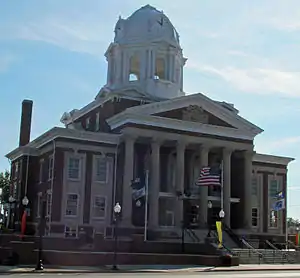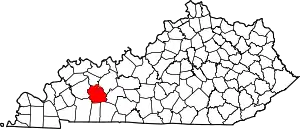Greenville, Kentucky | |
|---|---|
 The courthouse in Greenville | |
 Flag | |
 Location in Muhlenberg County, Kentucky | |
| Coordinates: 37°12′26″N 87°10′35″W / 37.20722°N 87.17639°W | |
| Country | United States |
| State | Kentucky |
| County | Muhlenberg |
| Settled | 1812 |
| Incorporated | 1848 |
| Named for | Maj. Gen. Nathanael Greene or nearby forests |
| Government | |
| • Mayor | Eddie DeArmond |
| Area | |
| • Total | 5.27 sq mi (13.66 km2) |
| • Land | 5.13 sq mi (13.30 km2) |
| • Water | 0.14 sq mi (0.36 km2) |
| Elevation | 525 ft (160 m) |
| Population | |
| • Total | 4,492 |
| • Estimate (2022)[3] | 4,401 |
| • Density | 874.78/sq mi (337.78/km2) |
| Time zone | UTC-6 (CST) |
| • Summer (DST) | UTC-5 (CDT) |
| ZIP Code | 42345 |
| Area code(s) | 270 & 364 |
| FIPS code | 21-33022 |
| GNIS feature ID | 0493344 |
| Website | www |
Greenville is a home rule-class city in Muhlenberg County, Kentucky, in the United States. It is the seat of its county.[4] The population was 4,492 as of the 2020 census.[2]
History
The town was settled in 1799 on an estate donated by local landowner William Campbell in order to establish a seat of government for a new county. Greenville was not established by the state assembly until 1812, however.[5] It was incorporated as a city in 1848.[6]
The city was probably named for the Revolutionary War general Nathanael Greene.[7] Local lore holds it was named by Campbell's wife after the abundant forests seen from the town's hilltop location.[5]
Geography
Greenville is located in central Muhlenberg County at 37°12′26″N 87°10′35″W / 37.20722°N 87.17639°W (37.207158, -87.176499).[8] It is bordered to the northeast by the city of Powderly.
U.S. Route 62 passes through Greenville as Main Street and Hopkinsville Street. It leads northeast through Powderly 7 miles (11 km) to Central and west 17 miles (27 km) to Nortonville. Kentucky Route 189 passes through the northern part of Greenville and bypasses the downtown to the northwest; it leads southwest 33 miles (53 km) to Hopkinsville. Kentucky Route 181 joins US 62 through the center of Greenville but leads north 16 miles (26 km) to Sacramento and south 30 miles (48 km) to Elkton. Kentucky Route 171 also leads south to Elkton but by a longer western route. Kentucky Route 178 leads east 7 miles (11 km) to Drakesboro.
According to the United States Census Bureau, Greenville has a total area of 5.27 square miles (13.6 km2), of which 5.14 square miles (13.3 km2) are land and 0.14 square miles (0.36 km2), or 2.62%, are water.[1] It is drained by Caney Creek, which flows eastward through the northern part of the city toward Pond Creek, a tributary of the Green River.
Demographics
| Census | Pop. | Note | %± |
|---|---|---|---|
| 1830 | 217 | — | |
| 1870 | 557 | — | |
| 1880 | 866 | 55.5% | |
| 1890 | 968 | 11.8% | |
| 1900 | 1,051 | 8.6% | |
| 1910 | 1,604 | 52.6% | |
| 1920 | 1,917 | 19.5% | |
| 1930 | 2,451 | 27.9% | |
| 1940 | 2,347 | −4.2% | |
| 1950 | 2,661 | 13.4% | |
| 1960 | 3,198 | 20.2% | |
| 1970 | 3,875 | 21.2% | |
| 1980 | 4,631 | 19.5% | |
| 1990 | 4,689 | 1.3% | |
| 2000 | 4,398 | −6.2% | |
| 2010 | 4,312 | −2.0% | |
| 2020 | 4,492 | 4.2% | |
| 2022 (est.) | 4,401 | [9] | −2.0% |
| U.S. Decennial Census[10] | |||
As of the census[11] of 2000, there were 4,398 people, 1,859 households, and 1,217 families residing in the city. The population density was 921.7 inhabitants per square mile (355.9/km2). There were 2,047 housing units at an average density of 429.0 per square mile (165.6/km2). The racial makeup of the city was 89.88% White, 8.75% African American, 0.16% Native American, 0.09% Asian, 0.11% from other races, and 1.00% from two or more races. Hispanics or Latinos of any race were 0.30% of the population.
There were 1,859 households, out of which 25.4% had children under the age of 18 living with them, 49.8% were married couples living together, 12.9% had a female householder with no husband present, and 34.5% were non-families. 32.7% of all households were made up of individuals, and 18.2% had someone living alone who was 65 years of age or older. The average household size was 2.19 and the average family size was 2.75.
The age distribution was 19.1% under the age of 18, 7.6% from 18 to 24, 23.7% from 25 to 44, 25.2% from 45 to 64, and 24.4% who were 65 years of age or older. The median age was 45 years. For every 100 females, there were 77.7 males. For every 100 females age 18 and over, there were 73.9 males.
The median income for a household in the city was $25,521, and the median income for a family was $35,571. Males had a median income of $37,454 versus $18,375 for females. The per capita income for the city was $19,708. About 14.2% of families and 19.0% of the population were below the poverty line, including 24.1% of those under age 18 and 15.4% of those age 65 or over.
Economy
The 1987 Encyclopedia of Kentucky refers to Greenville as "the unofficial capital of the Black Belt", a reference to the area's production of coal and dark tobacco.[12]
Education
Greenville has a lending library, a branch of the Muhlenberg County Public Library.[13] Schools located in town include Greenville Elementary School and Muhlenberg South Middle School.
Arts and culture
Veterans Plaza
The Muhlenberg County Veterans Mall and Plaza was originally constructed in the mid-1980s as the "Muhlenberg County War Memorial" to honor veterans who fought in World War I, World War II, the Korean War and the Vietnam War. The construction of the current plaza began in the mid-2000s as a part of the Muhlenberg County Courthouse renovations. New additions to the memorial include the Lt. Ephraim McLean Brank Memorial, located at the entrance of the plaza and the Historic Gristmill Stone which is a tribute to the song "Paradise" by John Prine.[14][15]
Thistle Cottage

Thistle Cottage, formerly the Duncan Cultural Center, occupies the former home of William Graham Duncan on Cherry Street in Greenville. Constructed in 1912, the home was donated to the city of Greenville by Hamilton Richardson Duncan Sr., the last of the Duncan family to reside there, in 1986. It became the Duncan Cultural Center a year later but did not open to the public until 1989. The house became a part of Muhlenberg County Public Libraries in 2013, at which time the name reverted to Thistle Cottage, as the home was originally christened by builder William G. Duncan.[16]
Today, the Center displays a number of artifacts related to the history and culture of Muhlenberg County, including a coal museum. It is also available for rent to host parties and other special events.
Muhlenberg County Rail Trail

The Muhlenberg County Rail Trail is a paved trail following an old Paducah and Louisville railway route between Central City, Kentucky and Greenville that is open to pedestrian and non-motorized vehicle traffic. Kentucky's most extensive rail trail conversion to date, the Muhlenberg Rail Trail opened October 20, 2000 and was named "Trail of the Month" by the Rails to Trails Conservancy in May 2004.[17] A viewing platform and birding guide are available where the trail passes through a local wetland.[18] The Muhlenberg County Rails to Trails Committee has railbanked an additional 3 miles (4.8 km) of abandoned rail, possibly for a later extension into McLean County.[19]
Notable people
- Ephraim McLean Brank (1791–1875), soldier and lawyer
- Ray Harper, college basketball coach
- Miles Heizer, actor
- Alney McLean (1779–1841), congressman from Kentucky
- Danny Morris (1946-2023), baseball player
- Edward Rumsey (1796–1868), congressman from Kentucky
- Jonathan E. Spilman (1812–1896), composer, attorney and minister
- Chasteen C. Stumm (1848–1895), African-American minister, teacher, journalist, editor, and newspaper publisher; attended school in Greenville[20]
- Benjamin Tod (Lost Dog Street Band), singer and songwriter
- Jim Walker, flautist
- Brent Yonts (1949–2021), state legislator and attorney
See also
- Other places named Greenville
References
- 1 2 "2022 U.S. Gazetteer Files: Kentucky". United States Census Bureau. Retrieved May 23, 2023.
- 1 2 "P1. Race – Greenville city, Kentucky: 2020 DEC Redistricting Data (PL 94-171)". U.S. Census Bureau. Retrieved May 23, 2023.
- ↑ "Annual Estimates of the Resident Population for Incorporated Places in Kentucky: April 1, 2020 to July 1, 2022". United States Census Bureau. Retrieved May 26, 2023.
- ↑ "Find a County". National Association of Counties. Archived from the original on May 31, 2011. Retrieved June 7, 2011.
- 1 2 Rennick, Robert M. (1987). Kentucky Place Names. University Press of Kentucky. p. 126. Retrieved April 28, 2013.
- ↑ Commonwealth of Kentucky. Office of the Secretary of State. Land Office. "Greenville, Kentucky". Accessed 28 July 2013.
- ↑ "History of Greenville, Muhlenberg County, Kentucky Archived 2006-08-29 at the Wayback Machine".
- ↑ "US Gazetteer files: 2010, 2000, and 1990". United States Census Bureau. February 12, 2011. Retrieved April 23, 2011.
- ↑ "Annual Estimates of the Resident Population for Incorporated Places in Kentucky: April 1, 2020 to July 1, 2022". United States Census Bureau. Retrieved May 26, 2023.
- ↑ "Census of Population and Housing". Census.gov. Retrieved June 4, 2015.
- ↑ "U.S. Census website". United States Census Bureau. Retrieved January 31, 2008.
- ↑ "Dictionary of Places: Greenville". Encyclopedia of Kentucky. New York, New York: Somerset Publishers. 1987. ISBN 0-403-09981-1.
- ↑ "Kentucky Public Library Directory". Kentucky Department for Libraries and Archives. Archived from the original on January 11, 2019. Retrieved June 7, 2019.
- ↑ "The Muhlenberg County Veterans Plaza". tourgreenville.com. Retrieved April 13, 2017.
- ↑ "Historic Gristmill Stone Greenville KY". tourgreenville.com. Retrieved April 13, 2017.
- ↑ "About Thistle Cottage". mcplib.org. Retrieved April 13, 2017.
- ↑ "Non-Existent Domain". railtrails.org. Archived from the original on June 23, 2004. Retrieved April 13, 2017.
- ↑ "Bike Trails, Walking Trails & Trail Maps – TrailLink". traillink.com. Retrieved April 13, 2017.
- ↑ "Muhlenberg County Rail Trail :: KRTC ::". kyrailtrail.org. Retrieved April 13, 2017.
- ↑ Pegues, Albert Witherspoon (1892). "Rev. C. C. Stumm". Our Baptist Ministers and Schools. Willey & Company. pp. 472–481.
